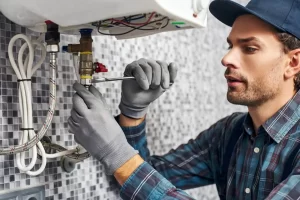How to Handle Blocked Drains at Home

Blocked drains are a common household issue that can quickly turn into a major inconvenience if not addressed. From slow-draining sinks to unpleasant odors and even water backups, drain blockages can disrupt daily routines and lead to costly repairs.
Signs of a Blocked Drain
Recognizing the early signs of a blocked drain can save you time and money:
Slow Drainage: Water drains slower than usual in sinks, tubs, or showers.
Gurgling Sounds: Noises from pipes indicate trapped air caused by blockages.
Unpleasant Odors: Foul smells can result from decomposing debris in the pipes.
Water Backups: Water pooling or backing up in sinks, showers, or toilets is a clear sign of a severe blockage.
Preventing Blocked Drains
Preventative maintenance is the best way to avoid blocked drains:
Use Drain Covers: Install covers to catch hair, food particles, and other debris.
Dispose of Grease Properly: Never pour grease or oil down the sink; instead, let it cool and throw it in the trash.
Avoid Flushing Non-Flushables: Only flush toilet paper and human waste; dispose of wipes, sanitary products, and other items in the bin.
Clean Drains Regularly: Flush drains with boiling water or a vinegar solution to prevent buildup.
Inspect Outdoor Drains: Keep outdoor drains clear of leaves, dirt, and debris, and watch for signs of root intrusion.
Conclusion
Blocked drains can be a hassle, but understanding their causes and taking preventative measures can save you from future headaches. While DIY solutions work for minor clogs, don’t hesitate to contact a professional plumber for persistent or severe blockages.
By staying proactive, you can keep your drains flowing smoothly and your home free from plumbing issues. If you’re dealing with a blocked drain, act quickly to prevent it from escalating into a bigger problem! Contact Emergency Plumber in Durham. After your call, we send in a short time the right plumber to you.
